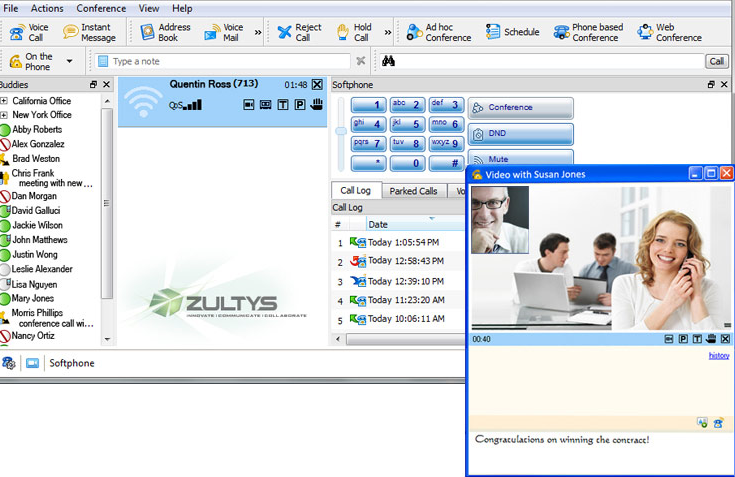First determine which voice platform to pursue based on how many handsets you need. The reason this is important is because there is an economy of scale to that will help you determine if you should go cloud based or traditional Phone system.

If you are purchasing a large number of a phones (100 or more) then it may be less expensive to purchase trunking and your own equipment. Keep in mind owning your own system means you are paying for maintenance and support.
If you are only looking for a small number of phones (less than 100) spread between a corporate office and at branch locations for example then a cloud phone system will offer you three really good benefits:
1) No capital outlay and no equipment to manage
2) Quick install interval, the phones are shipped pre-configured and are literally plug and play (no technician required)
3) Flexibility. You can scale the office (number of phones) up or down very easily. You might require 10 phones today but scale to 25 six months from now. Or maybe you start off with 50 and end up downsizing to 35 phones. Either way its easy to scale and phones can be shipped ready to plug and play.
- If you are purchasing less than 50 phones then cloud hosted VoIP will likely save you time and money. If you are purchasing over 50 phones at a single location and you have in-house IT support then it's worth considering both the traditional model as well as cloud to see what fits best.
When reviewing a system test the quality of the phones. Are they HD voice quality or just plain digital, are they built sturdy or cheap quality plastic. Next check out a demo and determine how easy management of the platform is. Can you see someone on your staff managing the system easily?
Those seem like a no brainer questions right? Well, it's really quite important because the market is full of cheap knock offs with poor sound quality. There are many IP phones on the market that do cool things like give you a big screen to put pictures or your logo on but the quality is very poor. You want make sure your investing is a system that will last and enhance your voice communications capabilities.
The same is true of the back end switch platform as well. Some will make all kinds of claims about ease of management etc but if the underlying platform is being run by some guy in the basement of his electrician shop rather than a reputable company with thousands of users and years of experience then you're asking for trouble. Make sure the carrier solution you are purchasing or renting is reputable and has clients nationwide. You might think your doing some local phone vendor a favor by giving them your business but in the long run your support and performance will suffer, choose on substance not on hype.
- You want to look for HD quality (High Definition Audio) and you want an open standard SIP phone not some proprietary phone that only works on one system. Remember just because it says Cisco or some familiar name doesn't mean it has quality audio.
A couple trusted examples are Polycom VVX series and Cisco 8000 series, stay away from the Yealinks, Grandstream and Cisco SPAs of the world. The best cloud platforms on the market today are MetaSwitch https://www.metaswitch.com/ , FreeSWITCH and Broadsoft https://www.broadsoft.com/ . There are some other up and coming platforms but if you stick with the most widely used you are guaranteed to find lots of providers and support. Carriers such as YipTel, MegaPath, Star2Star, Broadvoice, Ring Central and others are built on these platforms and offer good solutions. For a traditional system Avaya, Cisco and Zultys are 3 solid platforms, stay away from Asterisk, Toshiba and Vertical.
Determine what personnel you have to manage and support the system.
You might think that a good phone system would be mostly a "set it and forget it" kind of solution. However with the ever changing needs of business and the rapid pace of change you would be surprised how often that impacts your phones.
Employees leave, new ones are hired and that impacts the phones. How you handle lunch breaks and after hours affects the phones. New applications that integrate with the phone system affects the phones. Changes in advertising, or how calls are handled affects the phones. The list could go on and on.
- You want to invest in a phone system that is not only easy to manage and make changes on but also allows those changes to be made on the fly and in-house. You want a system that is agile and flexible for the ever changing needs of your business. The days of scheduling a technician to come in and move phones or make changes is too costly and frankly too slow.
After all if I can change my ring tone on my cell phone in less than a minute I should be able to change the location of a phone in the office without a technician. Lastly If you have an IT staff who is skilled in managing an IP network and understands phones then you want to find a system that IT can self-administer. If you do not have an IT staff or they just don't have a lot of experience in phone systems then you want a cloud system with free 24x7 support.
For a free checklist for purchasing a phone system click below.


